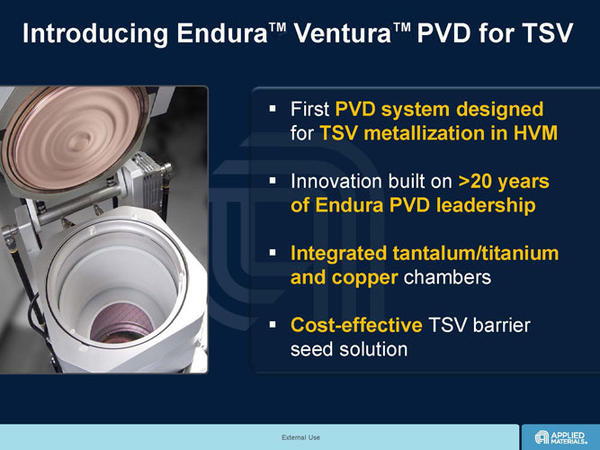半导体 (Semiconductor)
解决方案与软件
Endura™ Ventura™ PVD
As two-dimensional (2D) device scaling reaches physical and electrical limits, TSV technology is a means of transitioning to compact, three-dimensional (3D) architectures that make possible faster performance and greater functionality at lower power consumption in today’s proliferating mobile technologies. TSV enables product designers to create 3D interconnects that integrate circuit components from various nodes through vertical pathways connecting stacked chips or wafers.
Designed specifically for TSV metallization, the Applied Endura Ventura PVD system is Applied’s latest innovation in PVD, enabling customers to extend their 2D damascene integration infrastructure and knowhow to TSVs with aspect ratios of ≥10:1 and 2.5D interposer applications. It is also the first PVD system for TSVs to offer production-worthy titanium barrier deposition. Existing PVD systems for back-end-of-line (BEOL) applications are not designed for such high aspect ratio (HAR) features, which require high deposition rates to meet productivity requirements, void-free gap fill, and good reliability. To ensure continuous step coverage essential for gap fill and device reliability, these systems must deposit relatively thick layers. Besides costing more, thick films increase the risk of stress defects that can reduce the final yield.
Addressing these TSV challenges, the Ventura system significantly reduces the technology and cost obstacles to mainstream adoption of this technology. It employs improved ion density, directionality, and tunable energy to deposit continuous tantalum or titanium barrier and copper seed layers inside HAR TSVs that are more than 50% thinner than those of BEOL systems, and greatly reduce production costs. Thinner films and higher deposition rates more than double the Ventura system’s throughput over available BEOL PVD systems.
The system allows our customers to process the materials they choose. While Applied Materials does not sell these materials, the Ventura chambers have the flexibility to process both tantalum and titanium barriers, integrated on the Endura platform with the copper seed process. Both barrier materials demonstrate high reliability, with titanium offering further cost benefits.







- 1 / 7
- 2 / 7
- 3 / 7
- 4 / 7
- 5 / 7
- 6 / 7
- 7 / 7
